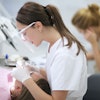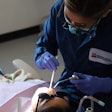The Maine House has voted in favor of a bill allowing midlevel dental therapists to practice in the state.
The bill, 1094, would create licensing guidelines and specifies the scope of duties dental therapists can perform. The House passed the bill with a vote of 102-39, according to an article in the Bangor Daily News.
According to the bill, a licensed dental therapist would be able to do the following:
- Perform oral health assessments, extractions, and caries preparations
- Place crowns and also place and remove space maintainers
- Administer local anesthesia and nitrous oxide analgesia
- Provide preventive care
- Provide urgent care for dental trauma and suturing
- Prescribe, in consultation with a supervising dentist or with standing orders from a dentist, anti-inflammatories, analgesics, antimicrobials, antibiotics, and anticaries materials
- Take radiographs
- Perform other related services and functions authorized by the supervising dentist and for which the dental hygiene therapist is trained
The bill also addresses dental coverage and reimbursement, continuing education, and a supervised clinical practice hours requirement -- 500 hours under a licensed dentist.
The bill must pass another vote in the House and two Senate votes before it becomes law, the article explained.
The Maine Dental Association (MDA) has voiced its vehement opposition to the bill and is lobbying against it. The new role is unnecessary because there is no dentist shortage in Maine and a new dental school at the University of New England will address potential dentist shortages, according to the organization. Most Mainers are within a 15-minute drive of a dental home, an MDA representative explained.
Supporters of the bill, which include the Pew Research Center and the American Dental Hygienists' Association, contended that some 40% of the state's dentists are nearing retirement. They also challenged the MDA's position on the need for more dental professionals, and said that with 600 practicing dentists, the state has fewer dentists per capita than any other in New England.
Rep. Anne-Marie Mastraccio (D-Sanford), a co-sponsor of the bill, compared the state's need for dental professionals in rural areas to Minnesota and Alaska, which have approved dental therapists.
Dental therapist programs could be opened at colleges and universities immediately after the bill's passage. To become dental therapists, students would have to complete an additional 18 months to two years of education, 1,000 hours of clinical training, and take a licensing test, the article stated.
Once licensed, they could work in private practices, nursing homes, schools, and assisted-living centers.



















